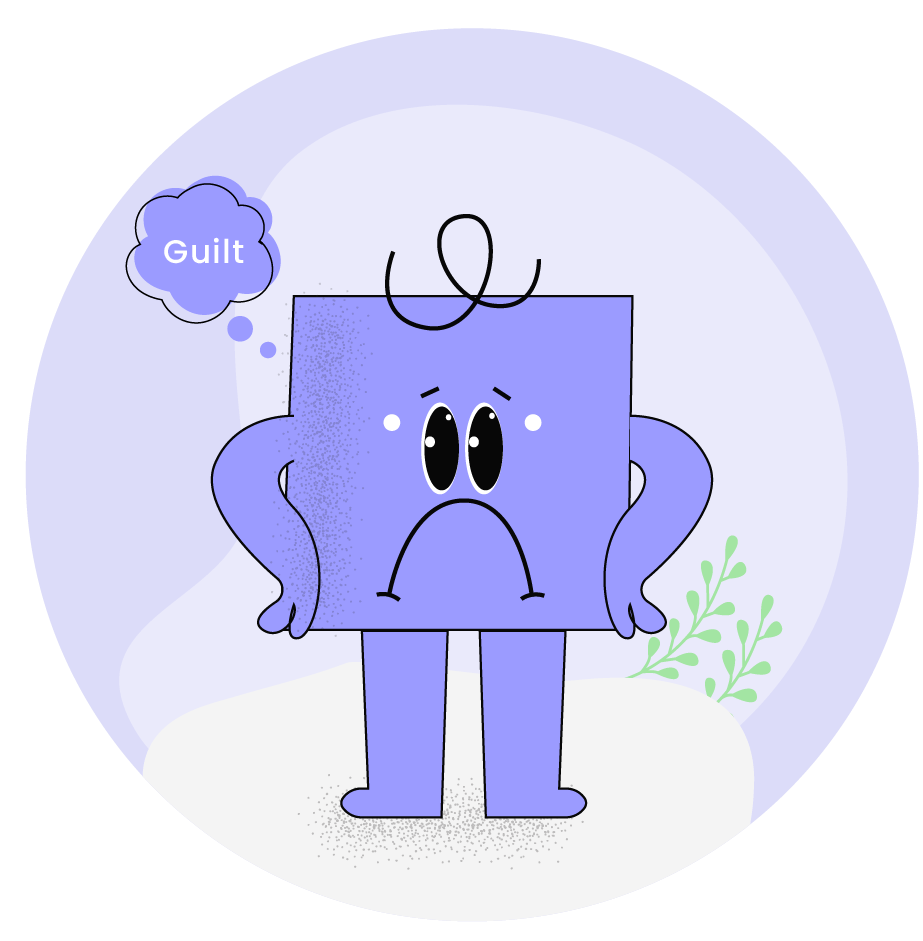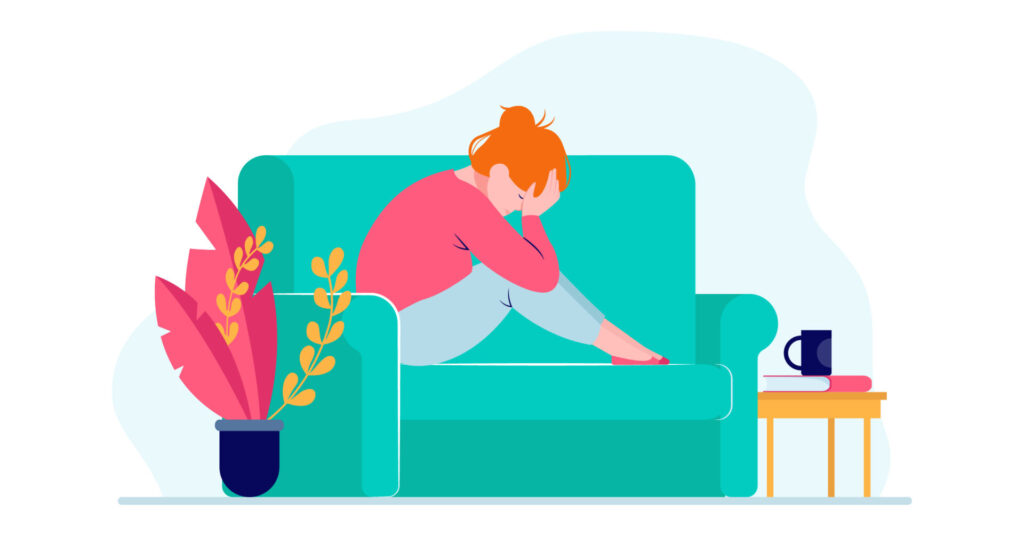The word guilt tends to have a negative connotation – largely because the adjective, “guilty” is usually used in reference with a crime, sin, and punishments. The emotion of guilt, however, stems from a negative feeling derived from a thought of having done wrong with a tinge of regret to it. And feelings of guilt can arise from intentional as well as unintentional mistakes.
The feeling of guilt relates to one’s moral conduct and value systems. It is a feeling that digs deeper into the mind of a person, and makes ample room for itself, enough to disturb the normal cognition and cause emotional dysfunction in a person. Guilt can be seen through verbal cues while someone is confessing something directly, but its roots are even stronger in the mind. And the mind is where you can begin to figure out how to deal with guilt.
How to Get Rid of Guilt
The intensified version of guilt can find other ways to come out if not identified and dealt with in time. Guilt is something that needs to be understood, acknowledged and worked upon by someone who feels guilty, irrespective of whether it is derived from their direct or automatic action or just a perceived one.
What Happens when You Don’t Know How to Deal with Guilt
Not dealing with guilt, and sitting with those feelings, can cause more harm than good. Here are some long lasting effects of guilt that are experienced and negatively impact one’s life.
- Guilt can shake your self confidence, degrade your own self-image resulting in negatively altering the personality. This is why you should learn how to deal with guilt.
- Another reason why you should learn how to deal with guilt? It develops a tendency in a human to blame their own self for possibly doing something wrong, and eventually hamper self-esteem.
- Shame, self-sabotaging behaviour, negative self-talk, hatred towards self, are some signs that highlight guilt in a person.
- When you experience guilt, you are most likely to perceive the world in a different manner, as they become over-sensitive towards the situations in life. This is why you should find a solution for how to deal with guilt.
- Actions are negatively evaluated and it goes on in a loop, and you remain stuck with those feelings.
- Overthinking and anxiety are dominantly experienced by someone who feels guilty. The pervasive pattern of negative thoughts makes it difficult for a person to think normally – this is why you should seek help on how to deal with guilt.
- Sleep problems like insomnia and having nightmares might happen due to recurring negative thoughts which make it difficult for an individual to be at rest.
- Guilt trips are one of the most common problems arising from guilt. Guilt tripping others or yourself means reminding them about the wrong they did. Guilt trips act as a barrier against achievements and prospects in life, making one feel like he/she does not deserve it or is not worthy of appreciation.
- The discomfort and self-blaming might lead to suicidal ideations or self-harm. The feeling of being wrong, making a mistake, being responsible for something terrible or thoughts of betraying can upset a person and cause major distress.
How to Deal with Guilt: Positives and Negatives
Although guilt is a negative feeling it can sometimes work in a positive manner. For example if a person is guilty about failing in a semester because of having a casual attitude towards academics, he/she might feel guilty about wasting the time and money. In this case, the guilt might work as a motivating factor for him/her and make him/her more focused on succeeding in the next exam.
Unfortunately, most of the time guilt is associated with some events, situations, actions or reactions that are irreversible. Whereas sometimes, it is just a belief and perception of an individual towards some consequences, for which he/she is not directly or evidently responsible for. Guilt cannot be erased and neither can be the mistake.

Forgiving yourself and letting go of guilt may require some expert guidance
Talk to an expert at Ananda today
How to Get Rid of Your Guilt
However, it is important to remember that the thoughts related to this perceived guilt or guilt coming out of actual realisation of a genuine mistake, has a scope for betterment. Here are some ways on how to deal with guilt which can help you overcome guilt and cope with guilty feelings.
1. Closure is a crucial aspect when it comes to healing from guilt. Closure is sometimes difficult to attain if it is dependent on another person that you might have done something wrong to, and does not achieve easily. Sometimes, if the circumstances are adverse, one might not be forgiven.
In other cases, the guilt might prevail and there might not be a source to confirm whether or not one is responsible for it. Either way, forgiving yourself should be the first priority and one of the steps in how to deal with guilt.
Closure will gradually follow once you forgive yourself, helping you overcome the guilt. Owning up to your own mistakes is the first step when you are determinant about committing a mistake. Taking up the responsibility to own the mistake will lower the burden.
2. Coming clean and confessing about a wrong move might lead to negative consequences, but it avoids the suppression of feelings. In some cases where it is not possible to confess or convey about it to the concerned people, it is still important to at least open up about it to your own self so you learn how to deal with guilt.
3. Guilt arising out of failures like not being able to be a good person, friend, partner, only destroys one’s will and self-efficacy. Remembering that failing once does not define one’s entire life and the good deeds done previously still count.
4. Understanding that you’re only a human and mistakes are an inevitable part of life is a very helpful tool to move ahead and learn how to deal with guilt. Acknowledging your mistakes, especially when you’re not directly responsible for the consequences, is an important part of the process. Remember that mistakes help you grow and enrich your being with life experiences.
5. Guilt always comes along with deeper and heavier feelings and is not easy to digest. It is important to lighten your mind before it starts showing physical symptoms like palpitation, fluctuation in blood pressure, headaches, claustrophobic feeling etc.
Meditation and breathing exercises lift your mood and help you keep calm during the emotional turmoil. These are some helpful tools for how to deal with guilt.
6. Affirming about not repeating the mistakes or not being in a place that leads you to guilt is a very healthy approach towards dealing with guilt. Developing a positively nurturing mind set, incorporating appropriate response patterns and strengthening your moral code are the key areas to work upon while healing from guilt.
7. Practising gratitude helps one learn how to deal with guilt and other negative feelings attached to it. Gratitude talks about being thankful for what you have currently. So cherishing the present, looking at the brighter side of the situation and considering the mistakes as learning is the gist of it. Gratitude is the key towards positive thinking.
8. Guilt makes one emotionally vulnerable and aggravates self-doubt. Guilt naturally raises questions like “why did I?”; “how could I?”, and concludes with “because I’m a bad person”, “this is what I deserve”, “I’ll never be good enough”.
Replacing the negative self-talk with a self compassionate approach contributes in pulling down the intensity of the guilt and teaches you how to deal with guilt with a softer point of view towards yourself. There will be overwhelming & extreme feelings all at once but positivity helps one to tame it down.
All these thoughts and feelings are valid and it is okay to feel that way, but it is equally important to remember that the power of validation and the closure to move on lies within only and only ourselves.
If you are suffering from feelings of guilt and want to learn how to deal with guilt, check in with an Ananda counsellor today.
Read More:
Grief : An Overwhelming Emotion
Teen Depression: Symptoms of Depression in Teens
10 Ways to Cope with Depression?
Postpartum Depression and Its Long Term Effects on Children
The Other Side of Motherhood: Postpartum Depression (PDD)
Postpartum Depression: Symptoms, Causes, Risks and Types








2 Responses
I always feel guilty for no strong reason. Is this a type of disorder? Whenever someone needs help and I cannot assist them, I feel guilty for weeks and cry a lot.
Feeling guilty stems from various reasons or past experiences. You can talk to our professionals about it in an individual session.